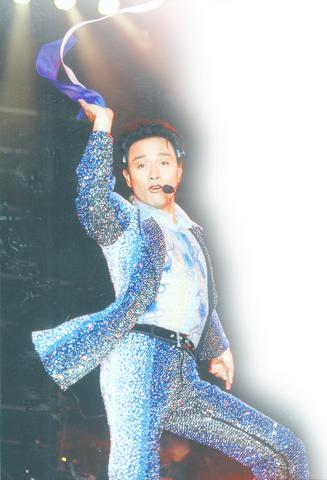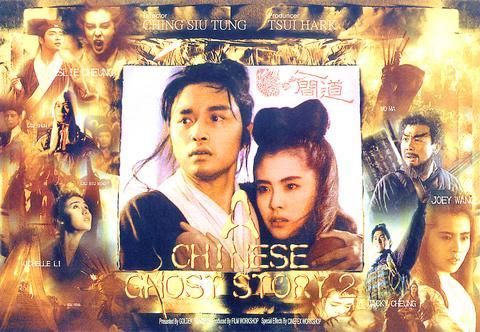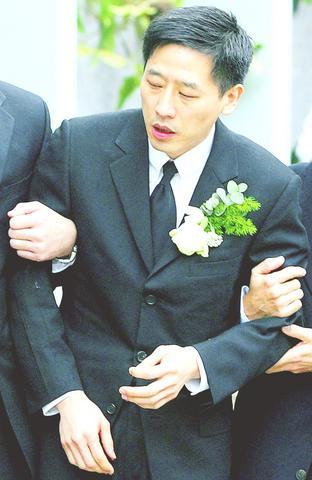Leslie Cheung's dramatic death marked an end to his colorful life. It also served to cement the legend he built up in the course of his career -- for the high standards he set himself and the bravery he showed in being the first openly gay actor in contemporary Chinese cinema.
On screen and stage, Cheung charmed audiences with his androgynous good looks and his wild antics. His concerts were always dramatic -- and so was the manner of his death.
During the rush hour on April 1, Cheung plummeted 24 floors from the gym of the five-star Oriental Mandarin onto the busy streets of Hong Kong's Central district, bringing traffic to a halt.

The news of his bloody death shocked Asia, for the 46-year-old star, who had reached the peak of his fame back in the 1980s, still had a solid fan base. Anyone growing up in Hong Kong, Taiwan or China during the 1980s will remember the glamor of his concerts; he remains an idol to many Asian women at their late 20s and 30s, who remember him from the days of A Better Tomorrow (英雄本色, 1986) and A Chinese Ghost Story (倩女幽魂, 1987).
Chinese-language media gave prominent coverage to Cheung's death, three full pages in some instances. Tabloids are already speculating on the reasons behind the tragedy, probing the nuances of the mysterious suicide note and the ups and downs of a long-term gay relationship that turned sour. Such heavy coverage of a celebrity's death is on a par with the media frenzy that surrounded the deaths of singer Teresa Teng (
Thousands of fans from around Asia ignored the danger of SARS, traveling to Hong Kong for a final farewell. Tong Hok-tak

PHOTO COURTESY OF GROUP POWER
The youngest of ten children of a well-known tailor, Cheung once described his childhood as an unhappy one. He was deeply affected by his parents' divorce and experienced racial discrimination as a student in Leeds, England.
From his childhood, he devoted himself to singing and dreaming. After returning to Hong Kong from the UK, Cheung worked as a sales person in a jeans store and then as a member of staff at a law firm. His break came when he won second prize at a pop contest in 1977, (where he sang American Pie). He jumped into the world of showbiz with his first album, titled Like Dreamin'.
The Hong Kong pop music scene of the 1980s emphasized expressive sentiment and romantic tunes, and there was a massive demand for baby-faced stars who were packaged as idols by the music industry. It was in this context that Cheung became popular.

PHOTO: REUTERS
With the 1984 hit Monica, Cheung was launched as a star. In 10 years, he published 18 records, and in 1989, set a record with 33 consecutive concerts.
At this time, Cheung's acting career also took off. John Woo's (
In the film, Cheung plays an opera-loving, opium-smoking dandy who falls for a beautiful courtesan. They decide to kill themselves when marriage plans are blocked by family pressure. Cheung's character gets cold feet and he survives. Thirty years later, the ghost of his lover comes in search of him.
In real life, Cheung was never a person to get cold feet. He was regarded as a perfectionist by many directors who worked with him, including Tsui Hark and Wang Kar-wai (
In it he plays a self-indulgent prodigal in the 1960s, a slicker who beats up people and enjoys wooing women. A scene in which Cheung narcissisticly dances a solo cha-cha in front of a mirror is reminiscent of John Travolta's self-involved dancing in Saturday Night Fever.
Days of Being Wild won Cheung Best Actor in the Hong Kong Academy Awards. It was Cheung's only acting award, despite his numerous nominations at both the Hong Kong Academy and Taiwan's Golden Horse Awards.
Cheung's roles are a strange mix of defiance, passion, pride and sophistication -- not unlike his private life. His rebellious, sexy image can be traced back to a 1982 film Nomad (烈火青春) where he boldly played a sex scene in a Hong Kong tram.
At his 1980s concerts, Cheung loved to wear open necked shirts, shiny embroidered suits and feather boas. In 2000, he pushed the limits still further when he got designer Jean-paul Gautier to create female costumes for him, including a short tartan skirt, feminine sandals and toe rings.
In the Oscar-nominated Farewell My Concubine (
This statement was a prelude to Cheung's official announcement of his sexuality.
The only actually gay character Cheung played was in Wang Kar-wai's 1997 film Happy Together (
The film won critical acclaim and, during a concert that year, Cheung declared his love for his partner Tong Hock-tak. Before singing the Mandarin love song The Moon is My Heart (
The announcement surprised many in the audience but also cleared up a long-time rumor about Cheung's sexuality. Leslie Cheung's brave declaration of his love earned him his place as the first openly gay actor in contemporary Chinese cinema.
The years after 2000 were bad years for Hong Kong cinema as well as Cheung's movie career. Between 2000 and 2002, Cheung made four mediocre films, and his most recent, the action film Double Tap (鎗王) and the ghost story Inner Senses (異度空間), Cheung failed to surpass, or even achieve, the quality of acting he achieved in Farewell and Happy Together.
For a star who had always striven to dazzle and who had grown used to a high level of success and praise, it was an especially difficult time. There had even been talk of the 46 year-old actor, who was proud of his boyish image, going bald. He was also rumored to be suffering from insomnia and depression, which some said was linked to evil spirits that dogged the shooting of Inner Senses.
Romantic problems, an inability to revisit the artistic heights of Farewell and Happy Together, and a decline of his idol status may all have contributed to his suicide. But, for an actor known to be afraid of heights, his jump from the Oriental Mandarin remains mysterious.
"Leslie often joked about being a legend. But I never thought that his legend would be completed in such a dramatic way. We will always remember him," said director Wang Kar-wai.

The 1990s were a turbulent time for the Chinese Nationalist Party’s (KMT) patronage factions. For a look at how they formed, check out the March 2 “Deep Dives.” In the boom years of the 1980s and 1990s the factions amassed fortunes from corruption, access to the levers of local government and prime access to property. They also moved into industries like construction and the gravel business, devastating river ecosystems while the governments they controlled looked the other way. By this period, the factions had largely carved out geographical feifdoms in the local jurisdictions the national KMT restrained them to. For example,

April 14 to April 20 In March 1947, Sising Katadrepan urged the government to drop the “high mountain people” (高山族) designation for Indigenous Taiwanese and refer to them as “Taiwan people” (台灣族). He considered the term derogatory, arguing that it made them sound like animals. The Taiwan Provincial Government agreed to stop using the term, stating that Indigenous Taiwanese suffered all sorts of discrimination and oppression under the Japanese and were forced to live in the mountains as outsiders to society. Now, under the new regime, they would be seen as equals, thus they should be henceforth

With over 100 works on display, this is Louise Bourgeois’ first solo show in Taiwan. Visitors are invited to traverse her world of love and hate, vengeance and acceptance, trauma and reconciliation. Dominating the entrance, the nine-foot-tall Crouching Spider (2003) greets visitors. The creature looms behind the glass facade, symbolic protector and gatekeeper to the intimate journey ahead. Bourgeois, best known for her giant spider sculptures, is one of the most influential artist of the twentieth century. Blending vulnerability and defiance through themes of sexuality, trauma and identity, her work reshaped the landscape of contemporary art with fearless honesty. “People are influenced by

The remains of this Japanese-era trail designed to protect the camphor industry make for a scenic day-hike, a fascinating overnight hike or a challenging multi-day adventure Maolin District (茂林) in Kaohsiung is well known for beautiful roadside scenery, waterfalls, the annual butterfly migration and indigenous culture. A lesser known but worthwhile destination here lies along the very top of the valley: the Liugui Security Path (六龜警備道). This relic of the Japanese era once isolated the Maolin valley from the outside world but now serves to draw tourists in. The path originally ran for about 50km, but not all of this trail is still easily walkable. The nicest section for a simple day hike is the heavily trafficked southern section above Maolin and Wanshan (萬山) villages. Remains of